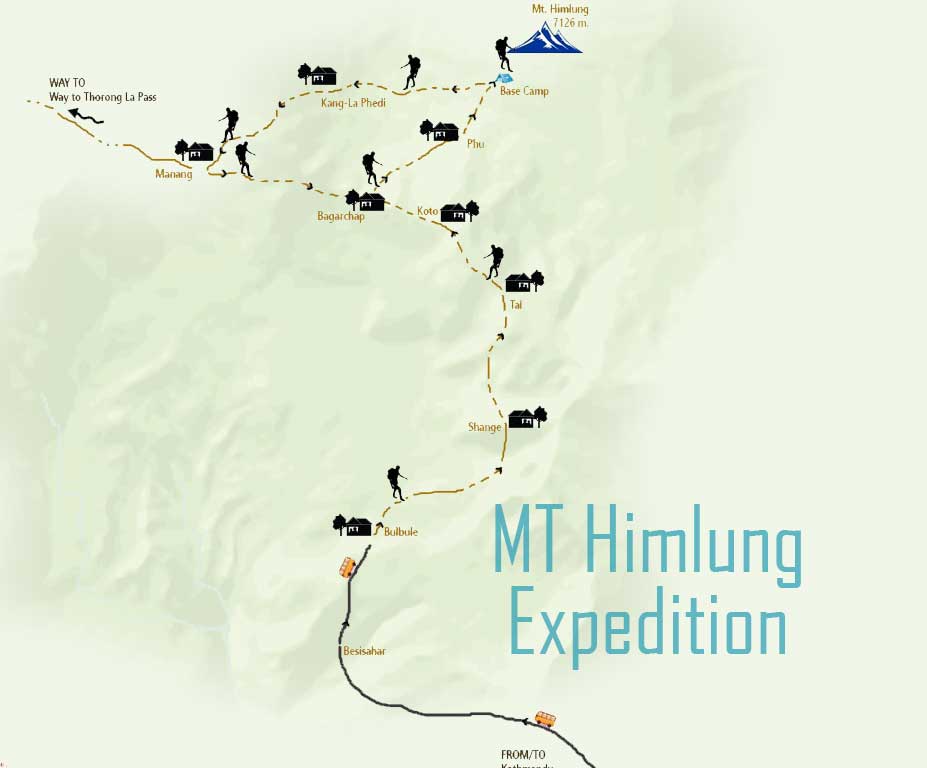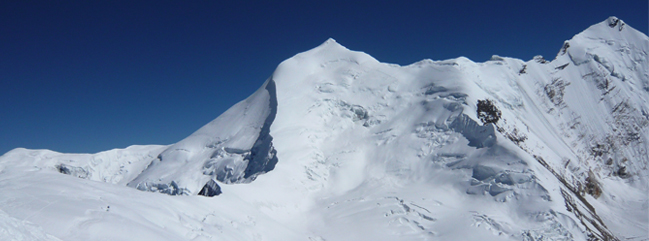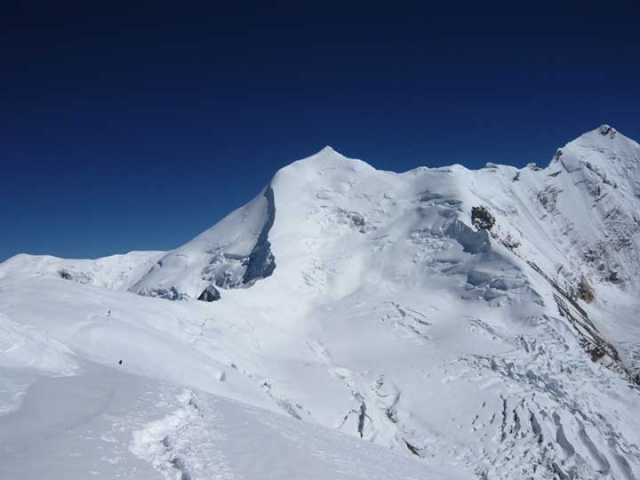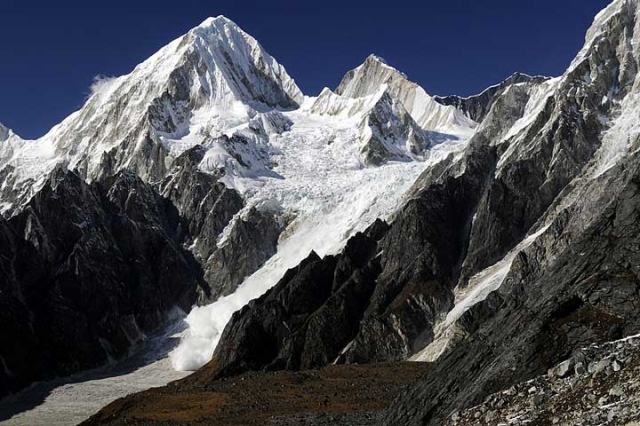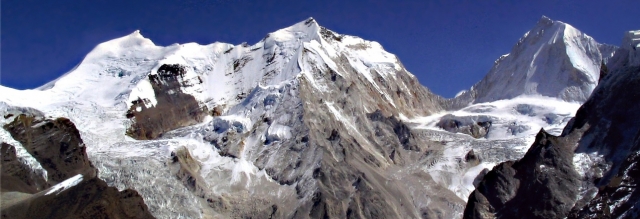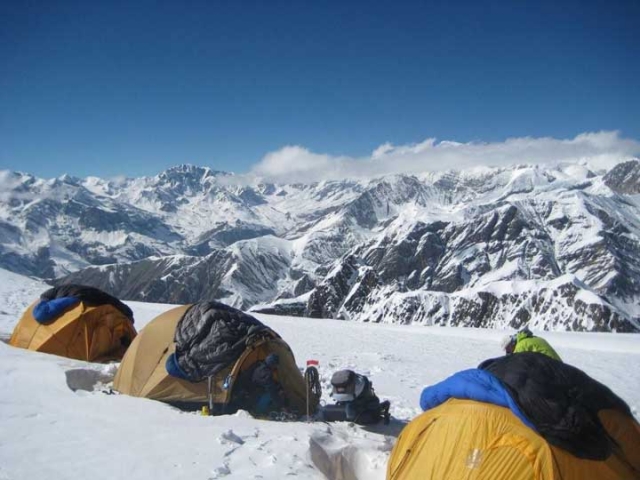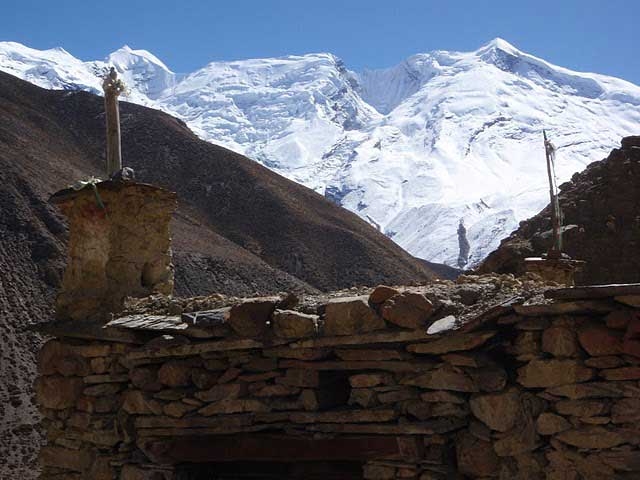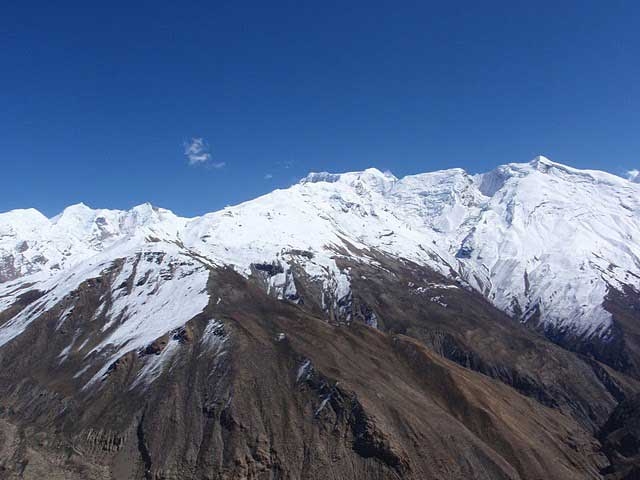Located in the Manaslu region northeast of the Annapurna region, Himlung Himal with an altitude of 7126 meters lies in the remote corner of Nepal and Tibet boarder. Previously a restricted region, Nepal Government opened the region only in 1992 by and so far only a few expedition teams including Japanese and French have summitted Mount Himlung. Expedition for Himlung Himal follows Round Annapurna route to Koto and from Koto towards Nar-phu Gaon. The route passes through high peaks and passes, glaciers, remote villages, narrow gullies, forests, rocks, springs, Gompas and unique cultural settlements. The expedition also offers mysterious culture and panoramic mountain views of Nandadevi, Rajramba, Api Himal, Kappa Chuli Peak and many more.
We establish our Base Camp at an altitude 4,850m on a grassy land. While our strong team of sherpas staffs set up camps, expedition members have the chance to going up and down for acclimatization. Three higher camps will be set up above the Base Camp. Camp 1 at 5,450 meters. Camp 2 at 6150 meters. Camp 3 at 6375 meters. The last part of the summit involves steep and icy climb. After summitting, descend to Camp 3. The next day, descend to the Base Camp.
Day 1: Arrival in Kathmandu & Transfer to Hotel
Day 2: Kathmandu. (Preparation for Expedition)
Day 3: Kathmandu, last preparation
Day 4: Drive Kathmandu – Besisahar
Day 5: Besisahar – Ngadi
Day 6: Ngadi – Jagat
Day 7: Jagat – Dharapani
Day 8: Dharapani – Koto
Day 9: Koto – Daramsala
Day 10: Daramsala – Phu Khola
Day 11: Phu Khola – Phugaun
Day 12: Phugaun – Himlung Base camp
Days 13 – 34: Climbing Period
Day 35: Preparation for depart
Day 36: Base Camp – Phugaun
Day 37: Phu Khola – Dharmasal
Day 38: Daramsala – Koto
Day 39: Koto – Dharapani
Day 40: Dharapani – Jagat
Day 41: Jagat – Nadi
Day 42: Ngadi – Besisahar – Kathmandu
Day 43: Kathmandu
Day 44: Farewell dinner at Kathmandu
Day 45: Final departure to your country
Q. I want to climb for Expedition, but there are so many options and the cost is high! Why should I choose Kiwi Sherpa ? What makes you different to other companies out there?
A. As we all know that when you make a decision to climb for expedition, it is one of the most financially challenging trips to come on. Our prices compared to other outfitters that provide the same product, services, if not a lesser product are actually less! We invite you to shop around and compare, both in price and quality. We feel strongly that you will find us to be the best in the business.
One of the main things that set us apart is our attention to detail. Nowhere else you will find a team of people more dedicated to your success! From the time you contact the office to the time you step on the mountain, our customer service is the best.
Our trip prices are much more reasonable compare to many global based companies; it is not because we are economical in service in which we operate. We are local operator therefore we DO NOT re-sell or use second party or agency. Many international companies will take anything from one third to three quarters of the profits this is how your trip price makes huge unusual.
Q. How the Expedition will operate?
A. After meeting all your team and crew in Kathmandu we fly by helicopter, drive by vehicle or fixed wing plane directly to the destination and then we start for trekking. Acclimatizing along the way and relishing in the hospitality provided by our Sherpa friends we reach base camp and after some rest and preparation we begin the ascent. Base camp will be a collection of sleeping tents, as well as a large kitchen and dining tent. We utilize the services of specially trained Sherpa cooks and we import a lot of high quality food to supplement the local produce available. The guides and Sherpas will fix rope on the route and stock the camps with provisions and equipment. By utilizing fixed rope we can climb in average weather, and, if necessary descend to base camp with little problem in case of a major storm. Two or three climbing Sherpas will assist with the load carrying but no more will be engaged in order to avoid clogging the route and spoiling the nature of the climb. When the fixed line is in place, and the two camps are established and stocked, we will climb back up the ropes and make a bid for the summit. Sufficient supplies will be available to support all members. Guides and Sherpas will carry all group gear but members are expected to carry their own personal gear. Radios will be used to co-ordinate the movements on the mountain and provide a safety back-up for the lead team.
Q. Can my friends and family come along to base camp for the expedition?
A. Sure! This is one of the best points to start the expedition, having family and friends trek to base camp to see you off on your journey. Base camp for non-climbers is not a very hospitable place, but we strive to make your guests comfortable and welcome. Guests for the duration of the expedition are allowed on a case by case basis. The reason for this is simple. On the trip, our job is to be climbing, spending time just at base camp can be quite boring sometimes, so we usually encourage guests to trek in at the beginning or end of the expedition, to join you during the most exciting parts of the trip! Contact us for cost and details.
Q. As the trip is so long, can I bring food and other gear not on the list?
A. Of course! Most people on the Expedition, members end up bringing “the kitchen sink”! We encourage you to bring some of your favorite goodies and tech toys, as base camp will become our home for 2 months or so. The more comfortable you are, the more energy you have for the climb, so every little thing helps!
Q. Is there a private trip option too? If yes, how does that work and what are the costs?
A. Doing Expedition is a once in a lifetime experience, we wanted to make sure you have every possible advantage. Some clients enjoy the added privacy and schedule flexibility that a private expedition allows. A private means you will have your own guides, your share of the Sherpa carry staff, a private dining tent, and optional private communication facilities. This allows you to climb at your own pace, and enjoy the mountain on your own terms. The costs vary depending on how many clients there are in your private group. Please contact the office for details.
Q. Are the skills/prior experiences required for this climb?
A. Simply, You cannot just decide to write a cheque and go and climb for Expedition ! A comprehensive climbing resume is required to join our team. The most required factor on our ‘Kiwi Sherpa’ is that the participants must have a solid understanding of mountaineering skills. This should include previous high altitude experience of at least 6,000 meters, mixed with a multitude of Alpine mountaineering and, preferably, you will have taken part in a previous 8,000-metre expedition. Please let us know if you want us to arrange training program in some of the 6000 and 7000 meters peaks in Himalaya before your expedition begin.
Q. What is the conditioning level needed for this climb?
A. You should be in the best shape of your life! This is our longest expedition of the year. It requires patience, stamina, mental fortitude, and a strong will. Summit day can sometimes be over 20 hours long! Day by day the challenges are different, but the more prepared you are, both mentally and physically, the smoother your trip will go.
Q. In a team, how many climbers will be on this expedition?
A. Maximum 10 members can be included on our Kiwi Sherpa. This is to ensure that we can maintain safety and our attention on detail. There may be more in base camp and in the camps on the mountain if there are private expeditions, but they will generally travel separately from the main team.
Q. Will I be sharing a tent or room with other climbers? Is there a single room option on this trip?
A. You will have your own tent in base camp, but on the mountain, you will be sharing a tent with others. We generally book you in to a single room in the hotel in Kathmandu whilst it is twin share in the lodges on the trek into base camp. A single supplement is available. Please contact us for further details.
Q. How heavy will my pack be?
A. It will depend on the day. On a “carry” day, where you are moving your personal gear between camps, your pack can be 20-40lbs, equal to 9-18kg , sometimes higher if you choose to carry more of your equipment. On “move” days, the weight goes down significantly, to 10-15lbs., 5-7kg.
Q. What kind of food do you have on the mountain? Or at the base camp?
A. All these will depend on what camp we are in. In the base camp, we import tons of food from Kathmandu. So don’t be surprised by our sushi nights, fresh muffins, yoghurt for breakfast, and pizza! On the mountain, we usually have a wide variety of meals; these are significantly tastier than freeze dried, as they are real food and ready to heat and eat! At Camp 2, our advanced base camp, we have Sherpa cook staff, who prepare more ‘base camp like’ food. Pizza, pasta, eggs and bacon! We work hard to make sure our food is second to none.
Q. How long will be a typical day on the mountain?
A. It depends on the day and your level of acclimatization. At the beginning of the trip, everything seems slower and longer, but as you get more adjusted to the mountain, the days go quicker. Average days can be 5-10 hours long. Summit day can be up to 20 hours long.
Q. Is communication possible on the expedition? If yes, what its type?
A. Experience has shown how important it is on expedition to be able to talk to every team member, at all times. If you join Kiwi Sherpa on expedition, you will have a dedicated radio. Each Sherpa will also have his own radio, so that at all times we can keep in touch with everyone, and everyone can keep in touch with each other.
Base Camp is equipped with a lap top and high speed satellite connection. The satellite communications are also used to send back regular reports, every couple of days, to Kiwi Sherpa office.
Q. What sort of hotels do we stay at in the city?
A. We use standard rooms from three/four star hotels in Kathmandu with breakfast included.
Q. What time should I arrive and where do I meet my guides?
A. There will be an Kiwi Sherpa representative at the airport to meet you, and the first of many team briefing occurs in the evening of day 1 and 2 in Kathmandu with our local Sherpa guides.
Q. How much should I budget for this expedition? How much cash should I plan to bring?
A. Since this is our biggest and longest trip, we usually suggest our expedition members to bring USD$2000 -$3000. This will cover everything from gifts, to bottled drinks, tips, and anything else that catches your eye on the trail. ATM cash machines work in Kathmandu, but only pays the local currency, Rupees.
Q. How much should I tip my guide staff?
A. This is a difficult thing to gauge. We have seen everything from 100USD to 15,000USD for an Expedition tip. Tipping is not required, but a small way to show your guides thanks for their help. The level of the tip should reflect the level of personal involvement with your guide.
The suggested tipping are as follow:
– Allow $150-250 for general non-sherpa crew who stay at base camp.
– Allow $200-350 for sherpas who go up to the base camp.
– Summit climbing Sherpa US$ 1000 – 1500 per Sherpa.
Q. What if I arrive early or depart late?
A. As long as possible, we request you to arrive in Kathmandu on the assigned date, to assure your baggage makes it on time, and you have time to recover from jet lag before trekking. It is hard to catch the group if you are arriving late and still waiting for lost baggage! We can arrange extra nights in the hotel. Many people depart from our Nepal expeditions later, to enjoy the sights and sounds of Kathmandu, but do keep in mind that this is long expedition and we find that people want to head home as quickly as possible after the climb finishes.
Q. Are there any entry or visa requirements?
A. Yes there are. Be sure to have the suggested USD amount in cash for your visa application and have a passport, photos for your arrival in Kathmandu. You will receive your visa at the airport, and we will add extra days later, as you are only ever issued a 90 days visa when you first arrive.
Q. Could I have my own personal Sherpa?
A. In our normal expedition you carry your personal equipment; sleeping bag, mattress/s, down suit, snacks, clothing while the sherpas carry the meals, gas, stoves, tents and oxygen. The team climbs together between camps and a climbing sherpa will also accompany you to the summit. This is a good level of service, and suits most people, however if you want an additional climbing sherpa to assist with your personal equipment and to climb with you all the time, we can provide. Please contact us.
Q. What kind of insurance do I need?
A. We invest in insurance coverage for commercial liability and medical and disability insurance for our employees and Sherpas while participating on our programs. We cannot insure you for your personal needs, but we do expect you to be as fiscally responsible as we are. We strongly recommend that you insure yourself against potentially expensive difficulties that may arise. First, trip cancellation insurance may provide financial relief should you be forced to withdraw from the climb before it even happens. Next, make sure you have adequate traveler’s medical and evacuation insurance for coverage should you have a problem during the trip. Medical care and evacuation from mountain can be expensive.
For the Rescue and Evacuation, Kiwi Sherpa strongly recommends that you purchase a Global Rescue membership to protect yourself and your family. We give you our word that you will be safer as a result. We are an authorized agent of Global Rescue, click here to sign up the membership plan today.
Q. Are the Kiwi Sherpa staff insured?
A. Our company insures all our trekking staff, including guide, cook, sherpa and porters.
Q. Can’t find your question here?
A. Contact us for further information!
Cost Includes
• 5 Nights accomodation in Kathmandu with bed & Breakfast
• Permit fee of Himlung 7145m.Expedition.
• Food for Trekking and Expedition period for Himlung .
• Staff: Base camp Guide, Cook, Cook helper .
• Porters to himlung Base camp .
• Annapurna Conservation Fee.
• Equipment allowance, daily allowance for Liaison officer, expedition crew
• Insurance for Nepalese expedition crew.
• 1 tent for 1 person for Expedition north face brand
• Mat, dining tent, Toilet tent, Mess tent, Store tent, Table and chairs trekking for the expedition
• Emergency Oxygen -Mask and regulator
• Satellite phone (Pay calls)
• Fare Well dinner.
Cost Excludes
• PERSONAL equipment for climbing & trekking
• Personal & medical Insurance of expedition
• Climbing food, Gas & stove above Base camp
• Lunch & dinner in Kathmandu
• Emergency Rescue evacuation by helicopter incase needed
• Walki Takie permit & Satellite phone permit
• Oxygen & Mask -regulator
• Personal expenses
• Bar Bills & beverage
• Garbage Deposit USD 2000.00 (Sharing of the total person) and Deposit fee will be not refunded if the clients (climber) don’t take back their garbage.
